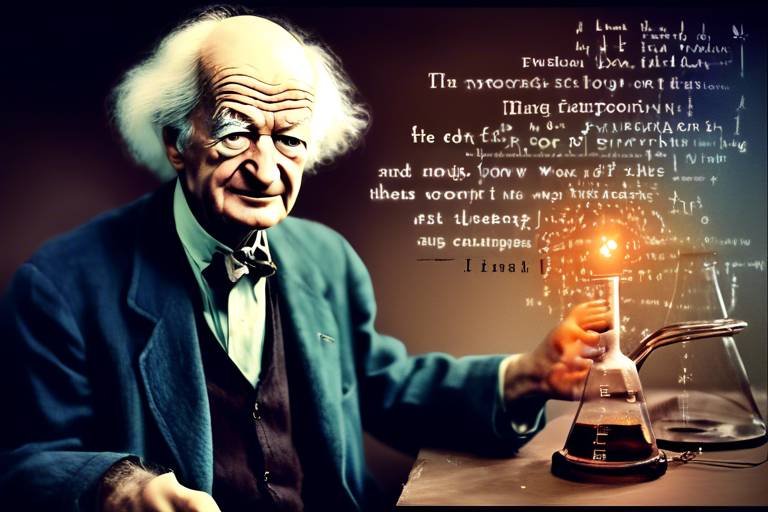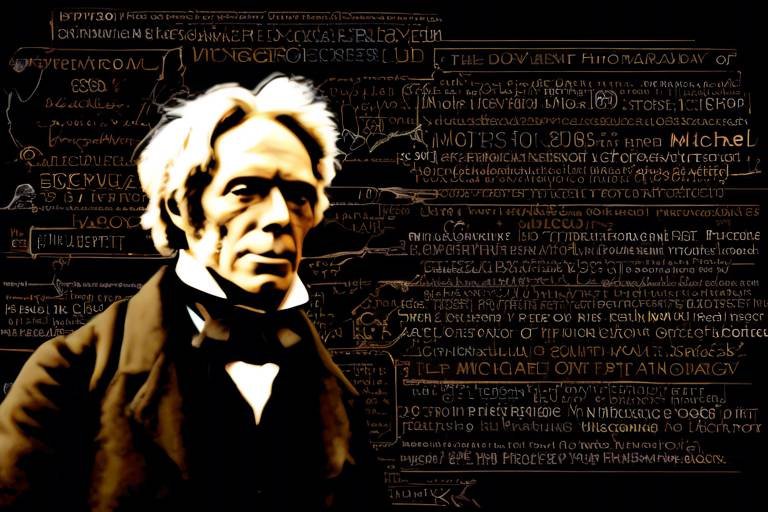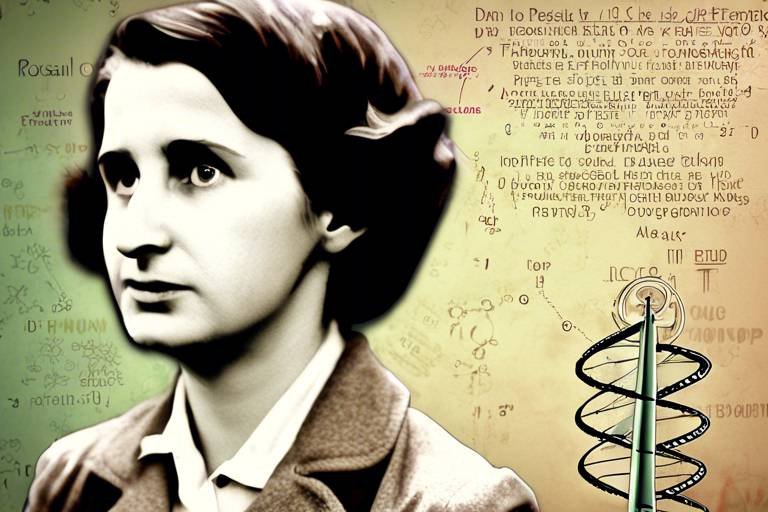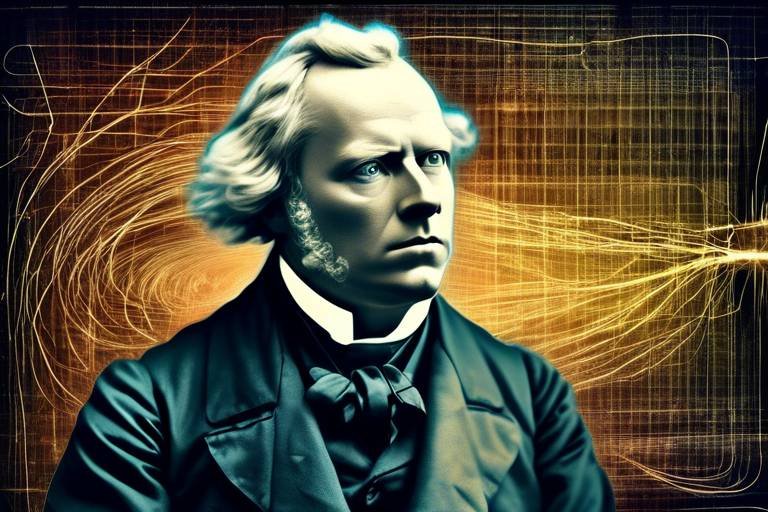The Work of Robert Koch and Germ Theory
When we think about the monumental shifts in medicine and public health, the name Robert Koch often stands out as a beacon of innovation and discovery. His pioneering work in microbiology laid the groundwork for what we now understand as germ theory, fundamentally changing how we perceive and combat infectious diseases. Before Koch, the connection between microbes and disease was largely speculative, but his meticulous research and groundbreaking methodologies provided the empirical evidence needed to establish this crucial link. Imagine a world where diseases were attributed to bad air or imbalances in bodily humors—Koch's discoveries brought a much-needed clarity to this chaos.
Born in 1843 in Germany, Koch embarked on a journey that would revolutionize medicine. His work was not merely academic; it was driven by a deep commitment to improving human health. He developed a series of criteria known as Koch's postulates, which serve as a scientific framework for linking specific pathogens to specific diseases. These postulates are not just a set of guidelines; they are the foundation upon which modern microbiological research is built. Koch's rigorous approach ensured that each pathogen could be isolated and identified, paving the way for targeted treatments and preventive measures.
One of Koch's most significant breakthroughs was his identification of Mycobacterium tuberculosis as the causative agent of tuberculosis. This was not just a scientific triumph; it was a turning point in the fight against a disease that had plagued humanity for centuries. Prior to Koch's discovery, tuberculosis was a death sentence, shrouded in mystery and stigma. His findings led to a profound understanding of the disease, facilitating the development of improved treatment protocols and public health strategies. The impact of this discovery was so profound that it earned Koch the Nobel Prize in Physiology or Medicine in 1905.
The implications of Koch's work extended far beyond the laboratory. His discoveries influenced public health policies across the globe, prompting initiatives for early detection, isolation, and treatment of tuberculosis. Imagine a society where the mere mention of tuberculosis could incite panic and fear—Koch's work helped to shift that narrative towards one of understanding and control. By implementing strategies that reduced transmission and mortality rates, public health officials could finally take a stand against this once-dreaded disease.
Moreover, Koch's influence didn't stop at tuberculosis. His principles and methodologies laid the groundwork for understanding other infectious diseases, such as cholera and anthrax. The framework he established for identifying pathogens became a standard that researchers would follow for generations. Wouldn't it be fascinating to see how his work continues to inspire modern scientists in their quest to unravel the complexities of infectious diseases today?
In addition to his groundbreaking discoveries, Koch's work led to the development of innovative diagnostic techniques. One such tool, the tuberculin skin test, remains a vital method for identifying tuberculosis infections. This test is a prime example of how Koch's research translated into practical applications that have saved countless lives. His methodologies in culturing bacteria and isolating pathogens also set the stage for modern laboratory techniques, enhancing our ability to study infectious diseases and develop effective vaccines.
As we reflect on Koch's legacy, it's essential to recognize how his contributions have shaped the field of microbiology. His rigorous scientific methods and dedication to empirical research continue to inspire new generations of scientists. The establishment of bacteriology as a distinct scientific discipline can be traced back to Koch's foundational work. This discipline has led to significant advancements in understanding microbial life and its impact on human health.
In recognition of his groundbreaking contributions, Koch received numerous accolades throughout his career, solidifying his status as a pivotal figure in the history of medicine and infectious disease research. His legacy is not just one of scientific achievement; it is a testament to the power of inquiry and the relentless pursuit of knowledge in the face of adversity.
- What are Koch's postulates? Koch's postulates are a series of criteria used to establish a causal relationship between a microbe and a disease.
- What disease did Koch discover the causative agent for? Koch identified Mycobacterium tuberculosis as the causative agent of tuberculosis.
- What impact did Koch's work have on public health? His discoveries led to improved public health policies, early detection methods, and treatment strategies for infectious diseases.
- What is the tuberculin skin test? It is a diagnostic tool developed by Koch that helps identify tuberculosis infections.
- How did Koch influence microbiology? Koch's methodologies and postulates laid the foundation for modern microbiological research, influencing the study of various infectious diseases.

Koch's Postulates
When we dive into the world of microbiology, one name stands out like a beacon of scientific achievement: Robert Koch. His formulation of in the late 19th century was nothing short of revolutionary. These postulates are a set of criteria that serve as a fundamental framework for linking specific pathogens to specific diseases, acting as a cornerstone of microbiological research. Imagine trying to solve a complex mystery without a clear set of clues; Koch's Postulates provided the essential roadmap for scientists to follow in the quest to understand infectious diseases.
The four postulates can be summarized as follows:
| Postulate | Description |
|---|---|
| 1 | The microorganism must be found in abundance in all organisms suffering from the disease, but should not be found in healthy organisms. |
| 2 | The microorganism must be isolated from a diseased organism and grown in pure culture. |
| 3 | The cultured microorganism should cause disease when introduced into a healthy organism. |
| 4 | The microorganism must be re-isolated from the experimentally infected host and identified as being identical to the original specific causative agent. |
These criteria not only laid the groundwork for germ theory but also provided a systematic approach to identifying the causative agents of various diseases. Think of it as a detective's guidebook—each postulate serves as a step in the investigation, ensuring that the link between a pathogen and a disease is scientifically validated. This rigorous methodology has transformed the way we approach infectious diseases, making it possible to pinpoint the exact causes and develop targeted treatments.
However, it’s essential to acknowledge that while Koch's Postulates were groundbreaking, they are not without limitations. For instance, some pathogens cannot be cultured in the lab, and certain diseases may be caused by multiple pathogens. Nevertheless, Koch's work has inspired countless researchers to refine these principles, adapting them to modern scientific methods and technologies.
In the grand tapestry of microbiology, Koch's Postulates remain a vital thread, weaving together the intricate relationships between pathogens and the diseases they cause. They have paved the way for advancements in diagnostics, treatments, and public health policies that continue to save lives today. Koch's legacy is not just in the postulates themselves but in the countless lives improved through the understanding of infectious diseases that his work has enabled.
- What are Koch's Postulates? Koch's Postulates are a set of four criteria established by Robert Koch to link specific pathogens to specific diseases.
- Why are Koch's Postulates important? They provide a scientific framework for identifying the causative agents of diseases, which is crucial for developing effective treatments and public health strategies.
- Are Koch's Postulates still used today? Yes, while they have limitations, Koch's Postulates have influenced modern microbiological research and continue to be a foundational aspect of infectious disease studies.

Discovery of Tuberculosis Bacillus
In the late 19th century, the world was grappling with a deadly epidemic—tuberculosis (TB). It was a time when the causes of many diseases were shrouded in mystery, often attributed to miasmas or bad air. Enter Robert Koch, a meticulous scientist whose groundbreaking work would change the landscape of medicine forever. In 1882, Koch identified the culprit behind this devastating disease: the Mycobacterium tuberculosis, a slender, rod-shaped bacterium. This discovery was not just a scientific triumph; it was a beacon of hope for millions suffering from TB.
Koch's journey to this monumental discovery was paved with rigorous experimentation and an unwavering commitment to empirical research. Using advanced staining techniques and a microscope, he was able to isolate and visualize the bacteria in the tissues of infected patients. Imagine the excitement that must have surged through him as he peered through the lens and saw what others could not! This was a pivotal moment in microbiology, providing the first concrete evidence linking a specific pathogen to a specific disease.
But Koch didn't stop there. He meticulously documented his findings, ensuring that his methods could be replicated by other scientists. This adherence to scientific rigor laid the groundwork for what we now know as Koch's Postulates, a series of criteria that established a framework for linking pathogens to diseases. These postulates would become a cornerstone of microbiological research, serving as a guide for future discoveries in the field.
The impact of Koch's discovery was profound. It not only enhanced our understanding of tuberculosis but also revolutionized the approach to infectious diseases. Before this, TB was often viewed as an incurable condition, a death sentence for many. However, with the identification of the tuberculosis bacillus, the medical community could now focus on developing targeted treatments and preventive measures. This shift in perspective was akin to turning on a light in a dark room, illuminating a path toward recovery and hope.
As the implications of Koch's work spread, public health policies began to evolve. Early detection and isolation of TB patients became paramount, leading to the establishment of sanatoria—specialized facilities designed for the treatment of tuberculosis. These institutions not only provided care but also served as a model for how society could combat infectious diseases through collective action.
In summary, Koch's discovery of the tuberculosis bacillus was not merely an academic achievement; it was a transformative moment in the history of medicine. It paved the way for advancements in diagnostics and treatment, significantly reducing the burden of tuberculosis on society. The legacy of his work continues to resonate today, reminding us of the power of scientific inquiry and its ability to change lives.
- What is tuberculosis? Tuberculosis is a contagious bacterial infection primarily affecting the lungs but can also impact other parts of the body.
- How did Robert Koch discover the tuberculosis bacillus? Koch used innovative staining techniques and microscopy to isolate and visualize the Mycobacterium tuberculosis in infected tissues.
- What are Koch's Postulates? Koch's Postulates are a set of criteria used to establish a causative relationship between a microbe and a disease, forming a foundational aspect of microbiology.
- What impact did Koch's discovery have on public health? His discovery led to improved diagnostic methods, early detection, and treatment strategies that significantly reduced tuberculosis transmission and mortality rates.

Impact on Public Health
The discovery of the tuberculosis bacillus by Robert Koch in 1882 was nothing short of revolutionary. It didn't just change the course of microbiology; it fundamentally transformed public health policies around the world. Before Koch's groundbreaking work, tuberculosis (TB) was often seen as a mysterious and untouchable disease, shrouded in stigma and fear. People didn't understand how it spread or how to combat it. Koch's identification of Mycobacterium tuberculosis as the causative agent provided a clear target for public health initiatives.
With this newfound knowledge, public health officials were able to implement strategies aimed at early detection, isolation, and treatment of TB patients. These strategies were vital in controlling the spread of the disease, which was rampant in urban areas during the late 19th and early 20th centuries. The impact of these measures can be summarized in several key areas:
- Early Detection: The development of diagnostic tools, such as the tuberculin skin test, allowed for the early identification of TB infections.
- Isolation of Patients: Understanding the contagious nature of TB led to the establishment of sanatoriums where patients could be isolated and treated effectively.
- Public Awareness Campaigns: Educational initiatives informed the public about the disease, its transmission, and prevention methods.
These efforts not only reduced transmission and mortality rates associated with TB but also paved the way for a more systematic approach to tackling infectious diseases in general. The lessons learned from Koch's work on tuberculosis laid the groundwork for future public health interventions against other diseases. For instance, the methodologies used to control TB were adapted to combat diseases like cholera and anthrax, demonstrating Koch's far-reaching influence.
Moreover, Koch's research instigated a paradigm shift in how society viewed infectious diseases. No longer were they considered simply a part of life; they became identifiable, treatable, and preventable. This shift in perception was crucial in mobilizing resources and funding towards public health initiatives, ultimately leading to better healthcare systems and improved life expectancy.
In summary, Koch's contributions to the understanding of tuberculosis not only saved countless lives but also revolutionized public health policies. His work serves as a powerful reminder of the importance of scientific research in shaping health outcomes and the necessity of continued investment in medical science to combat emerging infectious diseases.
- What is Robert Koch known for? Robert Koch is primarily known for identifying the causative agents of tuberculosis, cholera, and anthrax, and for developing Koch's postulates, which are essential criteria for linking pathogens to diseases.
- How did Koch's work impact public health? Koch's discoveries led to early detection, isolation, and treatment strategies for tuberculosis, significantly reducing its transmission and mortality rates.
- What are Koch's postulates? Koch's postulates are a series of criteria used to establish a causal relationship between a microbe and a disease, forming a foundational concept in microbiology.

Development of Diagnostic Techniques
Robert Koch's innovative approach to microbiology not only revolutionized our understanding of infectious diseases but also paved the way for the development of crucial diagnostic techniques. One of the most significant contributions he made was the creation of the tuberculin skin test, a method that remains a cornerstone in the identification of tuberculosis infections even today. This test involves the intradermal injection of a purified protein derivative (PPD) of the tuberculosis bacillus, which helps in determining whether an individual has been exposed to the bacteria.
But Koch didn’t stop there. His meticulous methods in culturing bacteria and isolating pathogens set the stage for a range of diagnostic techniques that have become standard practice in laboratories around the world. For instance, Koch's ability to cultivate specific bacteria in pure culture allowed for the identification of pathogens associated with various diseases. This was a game-changer in the medical field, as it enabled doctors and researchers to diagnose infections with remarkable accuracy.
To give you a glimpse of how Koch's techniques influenced modern diagnostics, consider the following table that outlines some of the key diagnostic methods derived from his work:
| Diagnostic Method | Description | Impact on Medicine |
|---|---|---|
| Tuberculin Skin Test | A test to detect latent tuberculosis infection by injecting PPD into the skin. | Enabled early detection and treatment of tuberculosis, reducing its spread. |
| Culture Techniques | Methods to grow bacteria in controlled environments to study their properties. | Facilitated identification of pathogens, leading to targeted therapies. |
| Staining Techniques | Use of dyes to differentiate between various types of bacteria under a microscope. | Improved diagnostic accuracy and understanding of bacterial morphology. |
Ultimately, the diagnostic techniques developed from Koch's pioneering work have had a profound impact on the field of medicine. They not only allow for the accurate identification of infectious agents but also inform treatment protocols that save countless lives. The legacy of these techniques continues to thrive in laboratories and clinics, demonstrating the lasting influence of Koch's contributions on public health.
- What is the tuberculin skin test? The tuberculin skin test is a diagnostic tool used to determine if someone has been exposed to the tuberculosis bacteria.
- How did Koch's methods change microbiology? Koch's methods introduced rigorous scientific techniques for isolating and identifying pathogens, which laid the groundwork for modern microbiology.
- Are Koch's diagnostic techniques still used today? Yes, many of Koch's techniques, like the tuberculin skin test, are still fundamental in diagnosing infectious diseases today.

Advancements in Laboratory Methods
Robert Koch's pioneering work in microbiology not only revolutionized our understanding of infectious diseases but also catalyzed significant . Before Koch, the field of microbiology was in its infancy, and many pathogens remained undiscovered. His innovative approaches to isolating and culturing bacteria laid a robust foundation for modern laboratory techniques that we still rely on today.
One of Koch's most notable contributions was the development of the agar plate method. By using agar as a solid medium for bacterial growth, he enabled scientists to cultivate and isolate individual bacterial colonies with unprecedented precision. This method allowed for the observation of bacteria in a controlled environment, leading to a clearer understanding of their morphology and behavior. Imagine trying to find a needle in a haystack; Koch's agar plates were like a magnet, drawing the needles out of the hay, making them easier to identify and study.
In addition to the agar plate method, Koch's emphasis on sterility transformed laboratory practices. He recognized that contamination could lead to misleading results, so he implemented rigorous sterilization techniques. This focus on maintaining a sterile environment ensured that researchers could study pathogens without interference from other microorganisms. Today, the importance of sterility is a fundamental principle in microbiology, echoing Koch's meticulous standards.
Moreover, Koch introduced the use of microscopy for observing bacteria, which was revolutionary at the time. His techniques for staining bacteria made them visible under the microscope, enabling scientists to differentiate between various types of pathogens. This advancement opened the door to a deeper understanding of bacterial structure and function, paving the way for future discoveries. For instance, the identification of gram-positive and gram-negative bacteria became a cornerstone of microbiological classification, influencing treatment approaches for numerous infections.
Another key advancement was the establishment of pure culture techniques. Koch's insistence on isolating pathogens in pure cultures allowed for the detailed study of specific microorganisms. This method is critical for identifying the causative agents of diseases and developing targeted treatments. In essence, Koch's work provided the tools necessary for scientists to conduct rigorous experiments that could lead to groundbreaking discoveries in public health.
To summarize the impact of Koch's advancements in laboratory methods, consider the following table:
| Advancement | Description | Impact on Microbiology |
|---|---|---|
| Agar Plate Method | Use of agar as a solid medium for bacterial growth. | Enabled isolation and observation of individual bacterial colonies. |
| Sterilization Techniques | Rigorous methods to maintain a sterile environment. | Prevented contamination and ensured accurate results. |
| Microscopy Techniques | Staining methods to visualize bacteria. | Facilitated differentiation between types of bacteria. |
| Pure Culture Techniques | Isolation of pathogens in pure cultures. | Allowed detailed study of specific microorganisms. |
In conclusion, the advancements in laboratory methods initiated by Robert Koch have had a lasting impact on microbiology and public health. His innovative techniques continue to influence modern research and diagnostics, enabling scientists to combat infectious diseases more effectively. Koch's legacy is not just in the discoveries he made but also in the methodologies he established, which remain crucial in the ongoing fight against pathogens.
- What are Koch's postulates? Koch's postulates are a series of criteria used to establish a causal relationship between a microbe and a disease.
- How did Koch's work influence public health? His discoveries led to improved disease detection, isolation, and treatment strategies, significantly reducing transmission rates.
- What is the agar plate method? It is a technique developed by Koch to culture bacteria on a solid medium, allowing for the isolation of individual colonies.
- Why is sterility important in microbiology? Maintaining sterility prevents contamination, ensuring that experimental results are accurate and reliable.

Influence on Other Diseases
Robert Koch's groundbreaking work didn't stop at tuberculosis; it reverberated through the entire field of infectious disease research. His principles and methodologies provided a robust framework that influenced studies on various other pathogens, including those responsible for cholera and anthrax. By establishing a clear link between specific microorganisms and the diseases they cause, Koch opened the door for future research, leading to a profound understanding of how infectious diseases spread and how they can be controlled.
For instance, Koch's meticulous approach to isolating and identifying pathogens was pivotal in the study of Vibrio cholerae, the bacterium that causes cholera. In the late 19th century, cholera was a devastating disease, claiming countless lives across Europe and Asia. Koch's research not only identified the bacterium but also highlighted the importance of sanitation and clean water in preventing outbreaks. This was a revolutionary idea at the time, and it laid the groundwork for public health initiatives that still resonate today.
Similarly, Koch's work on Bacillus anthracis, the causative agent of anthrax, further demonstrated his influence on understanding infectious diseases. His postulates were applied to establish a direct relationship between the bacterium and the disease, which was crucial in developing effective treatments and preventive measures. This kind of scientific rigor is what transformed bacteriology into a respected discipline, allowing researchers to systematically tackle various health crises.
Moreover, Koch's principles have had a lasting impact on the field of microbiology. They not only shaped our understanding of bacterial infections but also influenced the development of vaccines and antibiotics. For example, the methodologies he pioneered are still employed today in laboratories around the globe, driving forward our efforts to combat emerging infectious diseases.
In summary, Koch's influence extends far beyond tuberculosis. His work has been instrumental in shaping our understanding of multiple infectious diseases, establishing a scientific foundation that continues to guide research and public health strategies. The legacy of his contributions is evident in the ongoing efforts to combat diseases caused by various pathogens, reminding us of the importance of rigorous scientific inquiry in the quest for health and safety.
- What are Koch's postulates? Koch's postulates are a series of criteria used to establish a causal relationship between a microbe and a disease.
- How did Koch contribute to the study of cholera? Koch identified the bacterium responsible for cholera and emphasized the importance of sanitation in preventing outbreaks.
- What impact did Koch have on public health? His discoveries led to improved public health policies, including early detection and treatment strategies that significantly reduced disease transmission.
- Are Koch's methods still relevant today? Yes, Koch's methodologies continue to be foundational in microbiological research and the study of infectious diseases.

Legacy in Microbiology
Robert Koch's contributions to microbiology are nothing short of revolutionary. His meticulous research and innovative techniques paved the way for a new understanding of infectious diseases, transforming the field into a rigorous scientific discipline. Koch's legacy is not only encapsulated in his discoveries but also in the methodologies he developed, which are still in use today. Imagine a world where the invisible enemies of bacteria and viruses could be understood and controlled; Koch made that vision a reality.
One of the most significant aspects of Koch's legacy is the establishment of bacteriology as a distinct scientific discipline. Before his work, the study of bacteria was often relegated to the realm of speculation and untested theories. Koch introduced a systematic approach to studying microorganisms, emphasizing the importance of empirical evidence. His principles, outlined in Koch's postulates, provided a clear framework for linking specific pathogens to specific diseases. This scientific rigor laid the groundwork for future microbiologists to follow, ensuring that their findings were based on solid evidence rather than conjecture.
Moreover, Koch's legacy extends to the realm of public health. His discoveries not only advanced scientific knowledge but also had profound implications for societal well-being. For instance, his identification of Mycobacterium tuberculosis as the causative agent of tuberculosis led to the implementation of public health strategies aimed at early detection and treatment. As a result, mortality rates from tuberculosis dropped significantly in many parts of the world. This is a testament to how scientific discoveries can translate into tangible benefits for society.
In addition to his groundbreaking discoveries, Koch's influence can be seen in the way modern microbiology is practiced today. His emphasis on laboratory methods, such as culturing bacteria and isolating pathogens, has become standard practice in microbiological research. These techniques allow scientists to study infectious diseases more effectively and develop vaccines that save countless lives. In a sense, Koch's methodologies have become the DNA of microbiology, shaping how researchers approach the study of pathogens.
Furthermore, Koch's impact is evident in the way we approach infectious diseases beyond tuberculosis. His principles have been applied to research on other diseases, including cholera and anthrax. By establishing a framework for understanding the role of pathogens in disease causation, Koch opened the door for future research that has led to significant advancements in medicine. The ripple effects of his work continue to be felt in laboratories around the world.
As we reflect on Koch's legacy, it's essential to recognize the numerous accolades he received during his lifetime. His groundbreaking contributions earned him the prestigious Nobel Prize in Physiology or Medicine, solidifying his status as a pivotal figure in the history of medicine. Today, Koch is remembered not just as a scientist but as a pioneer who fundamentally changed our understanding of health and disease. His legacy inspires generations of scientists to continue the quest to unravel the mysteries of infectious diseases, ensuring that his work will never be forgotten.
- What are Koch's postulates? Koch's postulates are a series of criteria used to establish a causative relationship between a microbe and a disease. They serve as a foundational guideline in microbiological research.
- How did Koch contribute to public health? Koch's identification of disease-causing bacteria led to improved public health strategies, including early detection, isolation, and treatment of infectious diseases.
- What is the significance of Koch's work in modern medicine? Koch's methodologies and discoveries laid the groundwork for microbiology as a science, influencing the study and treatment of infectious diseases to this day.

Establishment of Bacteriology
Robert Koch's pioneering work in the late 19th century was instrumental in establishing bacteriology as a distinct scientific discipline. Before Koch, the understanding of diseases was largely speculative, with many attributing illnesses to miasmas or imbalances in bodily humors. However, Koch's rigorous approach to studying microorganisms fundamentally shifted this perspective. His meticulous methods for isolating and culturing bacteria provided a clear pathway for scientists to identify the specific organisms responsible for various diseases.
Koch's establishment of bacteriology was not merely a matter of identifying pathogens; it also involved developing techniques that would become standard practice in laboratories worldwide. For instance, he introduced the use of agar plates for culturing bacteria, which allowed for the growth of microorganisms in a controlled environment. This innovation was critical because it provided a solid medium that could support the growth of bacteria while being transparent enough for observation. The significance of this method cannot be overstated, as it paved the way for future research in microbiology and infectious diseases.
Furthermore, Koch's postulates, a set of criteria he developed to link specific pathogens to specific diseases, became the gold standard in bacteriology. These postulates are:
- The microorganism must be found in abundance in all organisms suffering from the disease, but should not be found in healthy organisms.
- The microorganism must be isolated from a diseased organism and grown in pure culture.
- The cultured microorganism should cause disease when introduced into a healthy organism.
- The microorganism must be re-isolated from the inoculated, diseased experimental host and identified as being identical to the original specific causative agent.
This framework was revolutionary, providing a systematic method for identifying pathogens and establishing a scientific basis for germ theory. Koch's dedication to empirical research and his insistence on rigorous testing ensured that bacteriology was founded on solid scientific principles, which has had lasting implications for medicine and public health.
Today, the field of bacteriology continues to evolve, building on Koch's foundational work. Researchers now delve into the complexities of microbial interactions, antibiotic resistance, and the role of the microbiome in human health. Koch's legacy lives on, inspiring new generations of scientists to explore the microscopic world and its profound impact on our lives.
- What is bacteriology? - Bacteriology is the branch of microbiology that focuses on the study of bacteria, including their classification, structure, function, and roles in various diseases.
- How did Robert Koch contribute to the field of bacteriology? - Koch established bacteriology as a scientific discipline through his innovative techniques for isolating and culturing bacteria, as well as formulating Koch's postulates to link specific pathogens to diseases.
- Why are Koch's postulates important? - Koch's postulates provide a systematic approach to identifying the causative agents of diseases, which has been fundamental in the development of microbiology and infectious disease research.
- What are some modern applications of bacteriology? - Modern applications include the development of antibiotics, vaccines, and diagnostic tests, as well as research into the human microbiome and its effects on health.

Recognition and Awards
This article explores Robert Koch's pioneering contributions to microbiology and the development of germ theory, highlighting his discoveries, methodologies, and their profound impact on medicine and public health.
Koch's postulates are a series of criteria established to link specific pathogens to specific diseases, forming a cornerstone of microbiological research and establishing a scientific basis for germ theory.
Koch's identification of Mycobacterium tuberculosis as the causative agent of tuberculosis was groundbreaking, leading to improved understanding and treatment of the disease, and earning him the Nobel Prize in Physiology or Medicine.
The discovery of the tuberculosis bacillus significantly influenced public health policies, prompting early detection, isolation, and treatment strategies that reduced transmission and mortality rates associated with the disease.
Koch's work led to the development of innovative diagnostic techniques, such as the tuberculin skin test, which remains a vital tool for identifying tuberculosis infections today.
Koch's methodologies in culturing bacteria and isolating pathogens laid the groundwork for modern microbiological techniques, enhancing our ability to study infectious diseases and develop vaccines.
Koch's principles extended beyond tuberculosis, influencing research on other infectious diseases, including cholera and anthrax, and establishing a framework for understanding the role of pathogens in disease causation.
Koch's legacy endures in microbiology, where his rigorous scientific methods and dedication to empirical research continue to inspire generations of scientists in the quest to understand and combat infectious diseases.
Koch's foundational work contributed to the establishment of bacteriology as a distinct scientific discipline, leading to significant advancements in the understanding of microbial life and its impact on human health.
Robert Koch's groundbreaking contributions to microbiology did not go unnoticed. His work earned him a plethora of accolades, solidifying his place in history as a pivotal figure in the field of medicine. Among his most notable achievements was the Nobel Prize in Physiology or Medicine awarded in 1905 for his discovery of the tuberculosis bacillus. This recognition was not merely a personal triumph; it represented a monumental leap forward in the fight against infectious diseases.
In addition to the Nobel Prize, Koch received several other prestigious awards and honors throughout his career:
- The Order of the Red Eagle from the German Emperor
- The Honorary Doctorate from the University of Berlin
- Membership in the Royal Society of London
These accolades reflect not only his scientific achievements but also the profound impact his discoveries had on public health and medical practices worldwide. Koch’s methodologies and findings laid the groundwork for future research and advancements, influencing countless scientists who followed in his footsteps.
- What are Koch's postulates?
Koch's postulates are a set of criteria designed to establish a causative relationship between a microbe and a disease, providing a scientific framework for microbiological research.
- What disease did Robert Koch discover the causative agent for?
Robert Koch is best known for identifying the causative agent of tuberculosis, which is the bacterium Mycobacterium tuberculosis.
- What impact did Koch's work have on public health?
Koch's discoveries led to improved public health policies, including early detection and treatment strategies that significantly reduced the transmission and mortality rates of tuberculosis.
Frequently Asked Questions
- What are Koch's postulates?
Koch's postulates are a set of criteria that Robert Koch developed to establish a causal relationship between a microbe and a disease. They serve as a foundational framework in microbiology, helping scientists identify the specific pathogens responsible for various illnesses.
- How did Robert Koch discover the tuberculosis bacillus?
Robert Koch discovered the tuberculosis bacillus, Mycobacterium tuberculosis, through meticulous research and experimentation. He isolated the bacterium from infected patients and demonstrated its role in causing tuberculosis, which was a game-changer in understanding and treating the disease.
- What impact did Koch's discovery have on public health?
Koch's identification of the tuberculosis bacillus significantly influenced public health strategies. It led to the establishment of early detection methods, isolation protocols, and treatment options, ultimately reducing transmission rates and mortality associated with tuberculosis.
- What diagnostic techniques did Koch develop?
Koch's work paved the way for innovative diagnostic techniques, including the tuberculin skin test. This test is still widely used today to identify individuals infected with tuberculosis, showcasing the long-lasting impact of Koch's research on modern medicine.
- How did Koch's methodologies advance laboratory methods?
Koch's rigorous methodologies for culturing bacteria and isolating pathogens laid the groundwork for contemporary microbiological techniques. His approach enhanced our ability to study infectious diseases, leading to significant advancements in vaccine development and disease management.
- Did Koch's principles apply to diseases other than tuberculosis?
Absolutely! Koch's principles were not limited to tuberculosis. They also influenced research on other infectious diseases, such as cholera and anthrax, establishing a broader framework for understanding the role of pathogens in various diseases.
- What is Koch's legacy in microbiology?
Koch's legacy in microbiology is profound. His dedication to empirical research and scientific methods continues to inspire new generations of scientists. His work laid the foundation for bacteriology and significantly advanced our understanding of microbial life and its impact on health.
- What recognition did Robert Koch receive for his contributions?
Robert Koch received numerous accolades for his groundbreaking work, including the Nobel Prize in Physiology or Medicine. His contributions solidified his status as a pivotal figure in the history of medicine and infectious disease research, leaving an indelible mark on the field.



















